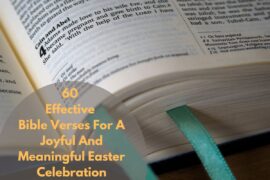The Prophecy About The Birth Of Jesus Christ stands as a beacon of divine foresight, a celestial narrative woven into the very fabric of human history. In this exploration, we look into the profound significance and intricate details of a prophecy that transcends time and resonates across cultures.
Contents
Prophecy About The Birth Of Jesus Christ
As we navigate the historical context, cultural nuances, and the divine revelations foretelling the Savior’s arrival, we embark on a journey that goes beyond the ordinary—a journey into the heart of a prophecy that has shaped the beliefs and convictions of millions worldwide.
Join us in unraveling the layers of this extraordinary prophecy, understanding the role of prophets, and witnessing the fulfillment of ancient promises that continue to inspire faith and hope.
The Significance of Prophecy
Understanding the Divine Plan
This refers to the exploration and comprehension of a grand, overarching plan believed to be orchestrated by a higher power or divine force. In this specific context, the focus is on unraveling the intricacies of the divine plan that foretells the birth of Jesus Christ.
The journey involves a deep dive into religious scriptures, likely the Bible, to uncover and analyze the detailed prophecies associated with the coming of Jesus Christ. These prophecies are considered to be profound insights or predictions given in advance, guiding the faithful believers through centuries.
The term “scriptures” typically refers to sacred texts or writings that hold religious significance. In Christianity, this would primarily involve the Old Testament, where prophecies about the Messiah, including the birth of Jesus, are believed to be found.
By looking into these scriptures, individuals seek a profound understanding of the divine plan, gaining insight into the events that led to the birth of Jesus Christ and how they align with the foretold prophecies. This journey is seen as a spiritual quest, aiming to connect with the divine and find meaning in the fulfillment of these prophecies through the birth and life of Jesus Christ.
Historical Context of the Prophecy
The Divine Revelation
Foretelling the Savior’s Arrival
The specific prophecies detailing the birth of Jesus Christ are primarily found in the Old Testament of the Bible, and they carry unique revelations about the arrival of the Savior. Each prophecy contributes to a multifaceted understanding of the significance of Jesus’ birth, often using symbolic language to convey a deeper divine message. Here are some key prophecies:
- Isaiah 7:14 (NIV): Prophecy: “Therefore the Lord himself will give you a sign: The virgin will conceive and give birth to a son, and will call him Immanuel.” Insight: This prophecy, often cited in connection with Jesus’ birth, speaks of a virgin birth and introduces the name “Immanuel,” which means “God with us.” The symbolic use of a virgin birth underscores the miraculous and divine nature of Jesus’ conception.
- Micah 5:2 (NIV): Prophecy: “But you, Bethlehem Ephrathah, though you are small among the clans of Judah, out of you will come for me one who will be ruler over Israel, whose origins are from of old, from ancient times.” Insight: This prophecy specifies Bethlehem as the birthplace of the Messiah, emphasizing the humble beginnings of a ruler whose origins are eternal. The use of Bethlehem carries symbolic weight, connecting the Messiah to the lineage of King David.
- Isaiah 9:6 (NIV): Prophecy: “For to us a child is born, to us a son is given, and the government will be on his shoulders. And he will be called Wonderful Counselor, Mighty God, Everlasting Father, Prince of Peace.” Insight: This prophecy not only foretells the birth of a child but also provides a rich set of titles and attributes for the expected Savior. The symbolic language here portrays the multifaceted nature of Jesus as a divine and benevolent leader.
- Hosea 11:1 (NIV): Prophecy: “When Israel was a child, I loved him, and out of Egypt, I called my son.” Insight: This prophecy is often seen as a foreshadowing of the flight of the Holy Family to Egypt to escape King Herod’s massacre of infants. The symbolic reference to Israel as God’s son draws a parallel to Jesus, indicating a divine plan and protection.
These prophecies use poetic and symbolic language to convey profound truths about the nature and mission of the expected Savior. They provide a mosaic of insights into the miraculous circumstances of Jesus’ birth, his royal lineage, divine attributes, and the fulfillment of ancient promises. The symbolic elements within these prophecies add depth and layers of meaning, inviting believers to contemplate the divine mysteries surrounding the advent of Jesus Christ.
Prophets and Their Role
Prophecy About The Birth Of Jesus Christ
Fulfillment of Prophetic Utterances
The fulfillment of the prophecies about the birth of Jesus Christ is a profound narrative that transcends time and space, marking a pivotal moment in religious history. According to Christian belief, these prophecies found in the Old Testament were validated through a series of events that unfolded around the birth of Jesus, confirming their divine origin. Let’s venture into some key events that signify the realization of these ancient prophecies:
- Virgin Birth in Bethlehem:
- Prophecy Fulfillment: The prophecy in Isaiah 7:14 foretold a virgin conceiving and giving birth. In Matthew 1:18-25 and Luke 1:26-38, the New Testament narrates the story of the Virgin Mary conceiving by the Holy Spirit and giving birth to Jesus in Bethlehem.
- Significance: The fulfillment of the virgin birth in Bethlehem not only echoes Isaiah’s prophecy but also establishes a miraculous and divine origin for Jesus, reinforcing the belief in his unique identity as the promised Messiah.
- Bethlehem as the Birthplace:
- Prophecy Fulfillment: Micah 5:2 specifically prophesied that the Messiah would be born in Bethlehem. In Matthew 2:1-6, the Magi inquire about the birthplace of the King of the Jews, and the chief priests and scribes cite Micah’s prophecy to confirm Bethlehem as the prophesied location.
- Significance: The fulfillment of the prophecy underscores the meticulous alignment of events with ancient predictions, emphasizing the divine orchestration behind the circumstances of Jesus’ birth.
- Titles and Attributes of the Messiah:
- Prophecy Fulfillment: Isaiah 9:6 described the coming Messiah with titles such as “Wonderful Counselor,” “Mighty God,” “Everlasting Father,” and “Prince of Peace.” The New Testament, especially in the Gospels, attributes these titles to Jesus.
- Significance: The fulfillment of these attributes not only validates the prophetic nature of Isaiah’s words but also provides a comprehensive understanding of Jesus’ divine nature and his role as the anticipated Savior.
- Flight to Egypt and Return:
- Prophecy Fulfillment: Hosea 11:1 spoke of God calling His son out of Egypt. In Matthew 2:13-15, Joseph is warned in a dream to take Jesus and Mary to Egypt to escape Herod’s massacre of infants. Subsequently, they return from Egypt.
- Significance: The events surrounding the flight to Egypt and return mirror Hosea’s prophecy, emphasizing God’s protective care over the infant Jesus and validating the intricate fulfillment of specific details.
The realization of these prophecies, as recounted in the New Testament, is seen by believers as a testament to the divine origin and foreknowledge embedded in the Old Testament scriptures. The events surrounding Jesus’ birth are not merely historical occurrences but are interpreted as the fulfillment of a divine plan set in motion centuries before. This narrative serves as a cornerstone of Christian faith, reinforcing the idea that Jesus is the long-awaited Messiah whose birth was foretold by the prophets of old.
Impact on Faith and Believers
The Prophecy About The Birth Of Jesus Christ holds profound and enduring impact on faith communities worldwide, transcending cultural and geographical boundaries. Its influence is deeply ingrained in Christian theology and continues to inspire and strengthen the convictions of millions. Here are key aspects of its impact:
- Foundation of Christian Faith: The fulfillment of prophecies related to Jesus’ birth is foundational to Christian faith. The belief that Jesus is the long-awaited Messiah, foretold in the Old Testament, forms the core of Christian doctrine. This foundational narrative unites diverse Christian denominations and serves as a source of shared identity.
- Validation of Divine Authority: The fulfillment of prophecies is often seen as a validation of the divine authority of the scriptures. It reinforces the idea that the Old Testament is not just a collection of historical writings but a divinely inspired record that accurately foretells significant events. This validation strengthens the trust that believers place in the sacred texts.
- Spiritual Significance and Redemption: The prophecies about Jesus’ birth convey a message of spiritual significance and redemption. They speak to the divine plan for salvation and reconciliation between God and humanity. The story of Jesus’ birth, as foretold by the prophets, resonates as a narrative of hope, grace, and the fulfillment of God’s promise to bring salvation to the world.
- Cultural and Liturgical Influence: The prophecy shapes the liturgical calendar and rituals within Christian traditions. The celebration of Christmas, commemorating the birth of Jesus, is a central event in the Christian calendar. The retelling of the nativity story, infused with the fulfillment of prophecies, becomes a powerful ritual that reinforces faith and provides a sense of continuity with ancient promises.
- Moral and Ethical Guidance: The prophecies about Jesus’ birth, coupled with his teachings, provide a moral and ethical framework for believers. The titles attributed to Jesus in the prophecies, such as “Prince of Peace” and “Wonderful Counselor,” inspire followers to embrace values of compassion, justice, and peace. The enduring impact extends beyond theological doctrines to influence ethical behavior and social engagement.
- Global Evangelical Mission: The fulfillment of prophecies is often used as a foundational narrative in global evangelical missions. Missionary efforts frequently draw upon the story of Jesus as the fulfillment of ancient prophecies to communicate the message of salvation to diverse cultures and communities worldwide.
- Personal Faith and Comfort: Individually, believers find profound comfort and assurance in the prophecies about Jesus’ birth. The realization of these prophecies reinforces the idea of a loving and providential God who fulfills promises. This personal faith provides solace in times of adversity and strengthens the spiritual journey of millions of individuals.
The Prophecy About The Birth Of Jesus Christ continues to exert a transformative and unifying influence on faith communities globally. Its enduring impact is evident in shaping theological doctrines, cultural celebrations, ethical principles, and the personal faith of millions who find inspiration and hope in the fulfillment of ancient promises.
Conclusion
In the tapestry of human experience, the Prophecy About The Birth Of Jesus Christ emerges as a timeless thread, weaving together the celestial and the earthly. As we conclude this exploration, we find not just a historical account but a living testament to the profound impact of divine intervention.
The fulfillment of these prophecies reverberates through faith communities, reinforcing the enduring power of hope and the reliability of spiritual promises. The Prophecy About The Birth Of Jesus Christ, with its rich tapestry of symbolism and fulfillment, remains an ever-present source of inspiration, inviting believers to reflect on the divine plan that unfolded centuries ago and continues to shape the course of human spirituality.
Frequently Asked Questions
1. What Does the Prophecy About The Birth Of Jesus Christ Foretell?
The prophecy foretells the miraculous birth of Jesus Christ, detailing specific circumstances and events surrounding this divine event.
2. How Did Prophets Receive These Prophecies?
Prophets received these prophecies through divine revelation, serving as vessels for transmitting God’s messages to humanity.
3. Were There Other Prophecies Related to Jesus Christ?
Yes, the Bible contains various prophecies related to Jesus Christ, each contributing to the overarching narrative of divine intervention.








